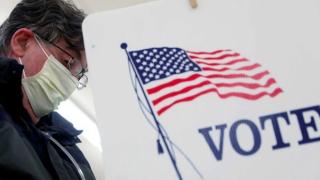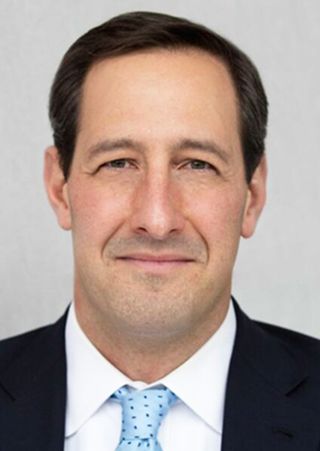In the midst of a searing national crisis during the US civil war, many Americans feared that the president might cancel the 1864 federal election.
But Abraham Lincoln knew the stakes.
Addressing supporters in November that year Lincoln stated that "if the rebellion could force us to forego, or postpone a national election, it might fairly claim to have already conquered and ruined us".
The 2020 American presidential election is scheduled to take place on November 3 and the question is whether Lincoln's reasoning still holds true amid the coronavirus crisis.
History suggests that the answer is yes.
Coronavirus is challenging the rules
The rules governing US presidential elections are set by federal law, Congress and the US Constitution. They were held during the American Civil War, both world wars and the Great Depression.
Yet the coronavirus crisis has forced the presidential campaign to change in unprecedented ways.
Several primary elections have been postponed, mass political rallies have been cancelled, Joe Biden and Bernie Sanders' debate was audience-free, and there has been a rapid shift to online campaigning.
Trump, Biden and Sanders have been forced to reinvent their campaign strategies, messages, and tone almost overnight.
There is simply no playbook for campaigns in a time of social distancing.

Can Trump survive without his rallies?
For Trump, a mainstay of his campaign (and presidency) has been holding rallies for his supporters.
Trump understands entertainment politics like no other political figure in America, and feeds off the energy of his free-wheeling rallies.
During the 2016 campaign he held over 300 rallies, and nearly 100 since his election.
Used to fire up his base, mobilise his supporters, encourage voter turnout and energise the president, these rallies have brought thousands of supporters together in arenas all over the country.
Throughout his term in office, whenever political troubles have appeared, his staff is quick to arrange a rally to provide Trump a venue to tout accomplishments, stoke grievances, re-direct the narrative, and keep the spotlight on himself.
But with almost all of the United States under stay-at-home directives, there is no possibility of a rally, nor will there be for months.
What happens when you take Trump's crowds away?
"It's very bad for Trump to not have crowds," Trump biographer Michael D'Antonio has said. "And I think he knows it,"
He is preparing a new message
If Trump's preferred venues have disappeared, so too has the main message of his re-election campaign.
Trump has argued his stewardship led to robust economic growth and extremely low unemployment. That message is now obsolete as the American economy heads towards a full-blown economic depression. Nearly 10 million Americans lost their jobs in a mere two weeks.
The president seems to be testing a new message — portraying himself now as a wartime president, with an implicit argument that it's dangerous to change horses midstream.
Trump is trying to use the daily White House briefings to shape his image as a wartime leader. American voters might buy Trump's argument that he alone can fix this, but it will be based on how well the administration handles this crisis as more Americans are confronted by the reality of the pandemic in their own communities.
What about the Democrats?
The challenges are different for the Democrats.
Despite Joe Biden's momentum at the primaries, the Democrats have still not formally selected a nominee to challenge Trump.
Biden has a virtually insurmountable lead, but there is little to suggest Sanders has any intention of dropping out.
As more state primaries get postponed and the Democratic nominating convention is delayed, Democrats face the challenge of figuring out how to choose their candidate in the absence of the normal process.
More pressing for the Democratic party is the immediate need to reinvent campaigning during the pandemic.
The party needs to raise hundreds of millions of dollars for advertising, generate enormous enthusiasm among the Democratic Party base to ensure voter turnout, and make the case to independents and wavering Trump supporters to switch to the Democratic candidate.
Biden, as the frontrunner, was just gearing up these efforts when the pandemic hit, bringing all of its efforts to an almost total halt.
Unable to count on fundraising events, campaign events, door-knocking, and essentially every other mainstay of the modern American presidential campaign, the campaign now has to find ways to try to replicate all of these essential functions — virtually.
And the campaigns are also certainly aware of the significant COVID-19 health risk to both Biden and Sanders, two men in their late-70s.
As the frontrunner, Biden's campaign also faces the challenge of trying to get out its message while practically all attention in the US is now directed at the local, state and federal response to the pandemic.
Biden does have an advantage here — voters consistently rank him highly on his empathy and ability to connect.
He will also certainly be making the case that the US response is floundering because of the devaluation of experts in Trump administration, and the lack of proper staffing, planning and response capabilities.
But the Biden campaign will have to carefully consider whether, and how, to attack Trump's response while presenting a better way forward.
How will voters respond?
As for the election in November, there are range of possible outcomes.
One possibility is that a majority of Americans will be so traumatised by the unfolding horror of the coronavirus, that even an adequate response by Trump will offset Trump's initial failures and their pre-existing grievances, and vote to keep him in office.
Yet there is another possibility that, as the coronavirus spreads, popular anger will grow at those deemed responsible for moving too slowly, downplaying risks, ignoring evidence, and allowing US stockpiles to dwindle to dangerously low levels. In that eventuality, Americans may back the Democratic argument that expertise is needed back in Washington.
The drastic impact on the US economy — and how the government responds — will also be a significant factor in voters decisions.
For many, Trump's election in 2016 was seen as a black swan event — a hard to predict event that comes as a surprise and has a disproportionately large impact — on American politics and America's foreign policy.
But now we find ourselves in the midst of a real black swan event as COVID-19 sweeps the globe.
There is no question that American politics has been turned on its head.
The effects will be widespread, long-lasting, and utterly impossible to predict.





